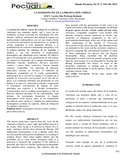La homeopátía en la producción animal
Fecha
2013-10-25Palabras Clave
Homeopatía, Bovinos, Cerdos, Caninos, Peces dulceacuícolaHomeopathy, Bovine, Pigs, Canine, Fish candyacuícola
Metadatos
Mostrar el registro completo del ítemResumen
La producción animal, espera del trabajo de la medicina veterinaria una respuesta rápida, ágil y veraz en sus resultados, al tratar o prevenir una enfermedad. Por ello, muchos médicos veterinarios han elegido la terapia con medicamentos homeopáticos, por ser una terapia donde se activan los mecanismo de autocuración, es carente de efectos residuales al estar altamente diluidos y la posibilidad de no ocasionar enfermedad iatrogénica; solo es preciso dominar los síntomas de los animales a medicar y con ello encontrar el medicamento homeopático que identifique estos síntomas. El objetivo que se ha perseguido con la presentación de este trabajo es exponer los resultados de la terapia homeopática en diferentes especies domésticas (bovinos, porcinos, caninos y peces dulce acuícolas). Fueron tratados síntomas compatibles con retención de placenta, infecciones uterinas en bovinos; el síndrome de disgalactia postpartum en la cerda; gastroenteritis hemorrágica en el caso de los caninos y su empleo en el traslado de Colossoma macropomun en el caso de los peces. Los resultados obtenidos son presentados en este trabajo y se anexa la valoración económica comparando el tratamiento convencional de algunas de estas patologías por especies y la terapia homeopática. Concluyéndose que la medicina homeopática es útil en diversos síntomas presentes en las enfermedades, aquí tratadas. Se recomienda desarrollar la terapia homeopática como táctica, tanto en los tratamientos preventivos como curativos y emplear los medicamentos homeopáticos en todas las especies, objeto de trabajo de los médicos veterinarios.
Colecciones
Información Adicional
| Correo Electrónico | ccvmayabeque@infomed.sld.cu |
| ISSN | 1856-111X |
| Resumen en otro Idioma | The animal production, expects from the work of the veterinary medicine a quick, agile and truthful answer in its results, when trying or to prevent an illness. For it, many veterinary doctors have chosen the therapy with medications homeopathies, to be a therapy where they are activated the autocuración mechanism, it is lacking of residual effects when being highly diluted and the possibility not to cause illness iatrogenic; alone it is necessary to dominate the symptoms of the animals to prescribe and with it to find the medication homeopathic that identifies these symptoms. The objective that has been pursued with the presentation of this work is to expose the results of the therapy homeopathic in different domestic species (bovine, swinish, canine and fish candy acuícolas). compatible symptoms were treated with placenta retention, uterine infections in bovine; the syndrome of disgalactia postpartum in the sow; gastroenteritis hemorrhagic in the case of the canines and their employment in the transfer of Colossoma macropomun in the case of the fish. The obtained results are presented in this work and the economic valuation is annexed comparing the conventional treatment of some of these pathologies for species and the therapy homeopathic. Being concluded that the medicine homeopathic is useful in diverse present symptoms in the illnesses, here treated. It is recommended to develop the therapy homeopathic like tactics, so much in the preventive treatments as healing and to use the medications homeopathic in all the species, object of the veterinary doctors' work. |
| Colación | 143-149 |
| Publicación Electrónica | Revista Mundo Pecuario |
| Sección | Revista Mundo Pecuario: Artículos |






